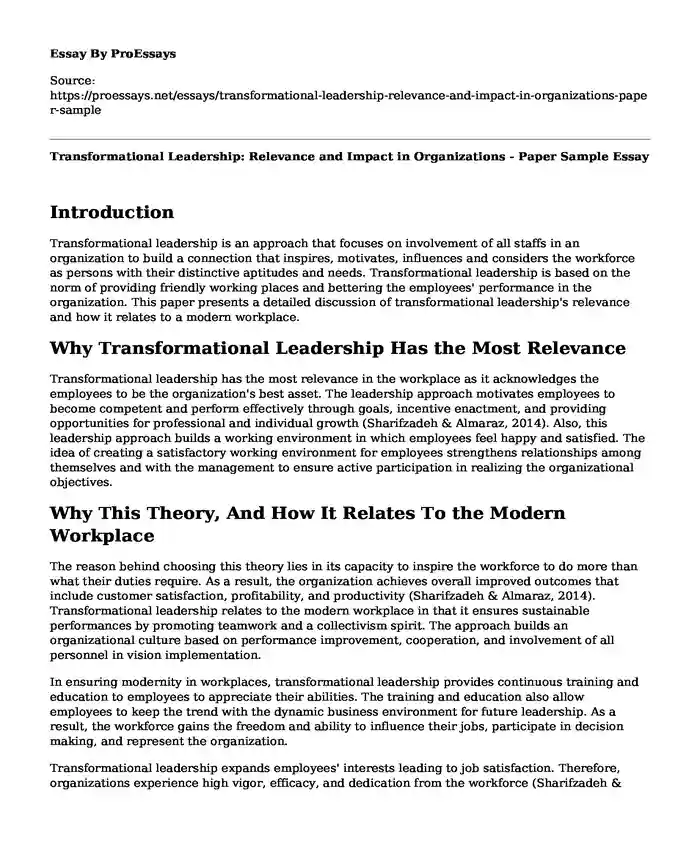Introduction
Transformational leadership is an approach that focuses on involvement of all staffs in an organization to build a connection that inspires, motivates, influences and considers the workforce as persons with their distinctive aptitudes and needs. Transformational leadership is based on the norm of providing friendly working places and bettering the employees' performance in the organization. This paper presents a detailed discussion of transformational leadership's relevance and how it relates to a modern workplace.
Why Transformational Leadership Has the Most Relevance
Transformational leadership has the most relevance in the workplace as it acknowledges the employees to be the organization's best asset. The leadership approach motivates employees to become competent and perform effectively through goals, incentive enactment, and providing opportunities for professional and individual growth (Sharifzadeh & Almaraz, 2014). Also, this leadership approach builds a working environment in which employees feel happy and satisfied. The idea of creating a satisfactory working environment for employees strengthens relationships among themselves and with the management to ensure active participation in realizing the organizational objectives.
Why This Theory, And How It Relates To the Modern Workplace
The reason behind choosing this theory lies in its capacity to inspire the workforce to do more than what their duties require. As a result, the organization achieves overall improved outcomes that include customer satisfaction, profitability, and productivity (Sharifzadeh & Almaraz, 2014). Transformational leadership relates to the modern workplace in that it ensures sustainable performances by promoting teamwork and a collectivism spirit. The approach builds an organizational culture based on performance improvement, cooperation, and involvement of all personnel in vision implementation.
In ensuring modernity in workplaces, transformational leadership provides continuous training and education to employees to appreciate their abilities. The training and education also allow employees to keep the trend with the dynamic business environment for future leadership. As a result, the workforce gains the freedom and ability to influence their jobs, participate in decision making, and represent the organization.
Transformational leadership expands employees' interests leading to job satisfaction. Therefore, organizations experience high vigor, efficacy, and dedication from the workforce (Sharifzadeh & Almaraz, 2014). Through this leadership approach, leaders can maximize quality performance as they are in an excellent position to identify mistakes and develop the right solutions.
Conclusion
Organizations that use transformational leadership benefit from improved job quality and general effectiveness. On the other end, employees benefit from psychological health, which includes low job anxiety, low depression, and optimum satisfaction.
Reference
Sharifzadeh, M., & Almaraz, J. (2014). Happiness and Productivity in the Workplace. American Journal of Management, 14(4), 19.
Cite this page
Transformational Leadership: Relevance and Impact in Organizations - Paper Sample. (2023, Oct 20). Retrieved from https://proessays.net/essays/transformational-leadership-relevance-and-impact-in-organizations-paper-sample
If you are the original author of this essay and no longer wish to have it published on the ProEssays website, please click below to request its removal:
- Personal Essay Example - Achieving Goals Through Cooperation
- Essay Sample on Company Team
- Effective Political Leadership Paper Example
- Responsibilities of Managers and Leaders Essay Example
- New Product Planning - Essay Sample
- Nursing Styles of Leadership Paper Example
- Change Management: Crafting an Organized Approach for Success - Free Essay







